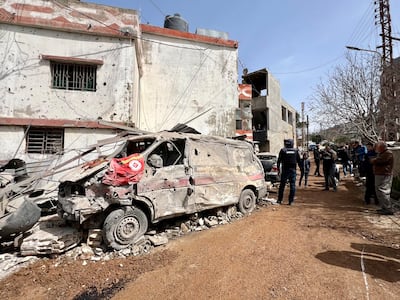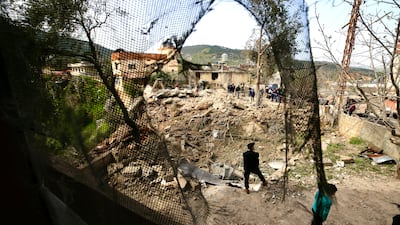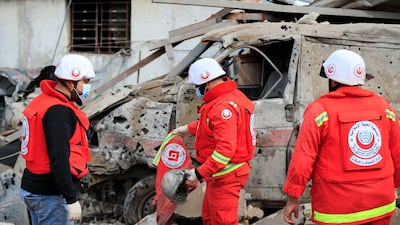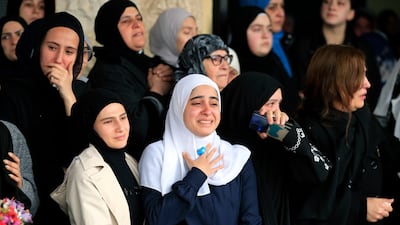Live updates: Follow the latest news on Israel-Gaza
At least 16 people were killed in south Lebanon on Wednesday and one in Israel in the deadliest day of fighting since conflict erupted between Israel and the Lebanese Hezbollah group nearly six months ago.
The hostilities, which began largely along the Lebanon-Israel border but have gradually grown in depth and scale, have raised fears of an all-out conflict between Israel and Hezbollah, as long as the war in Gaza continues.
There was intense fighting as Israel hit a cafe in the southern Lebanese town of Naqoura, killing three medics shortly after striking in the town of Tair Harfa, where at least six people were killed, Lebanon's National News Agency reported.
A representative for the Risala Scouts, a local civil defence organisation, said the three paramedics killed in the Naqoura cafe were on their way to Tair Harfa to retrieve the bodies of six others who had been killed in an earlier strike.
And NNA reported six bodies had been recovered from the rubble in Tair Harfa.
An Israeli army statement said that "fighter jets struck a terrorist cell located in a Hezbollah military compound in the area of Tair Harfa, and an additional terrorist cell in the area of Naqoura".
It is thought the strikes were in response to the death of a man in a rocket barrage on the Israeli town of Kiryat Shmona near the border, for which Hezbollah claimed responsibility on Wednesday afternoon.
Hezbollah was retaliating against an overnight Israeli strike that killed seven emergency responders in Habariyeh, south Lebanon.
The man killed in Kiryat Shmona, northern Israel, was a 25-year-old civilian, Israel's ambulance service said.
The seven killed in Habariyeh, close to the Israeli border, worked for the Islamic Medical Association, which is linked to Jamaa Islamiya, a Lebanese Sunni political party and armed faction with ties to Palestinian group Hamas.
Jamaa Islamiya said the “seven rescuers” were killed in an overnight attack on an emergency centre, where a dozen responders had been, and bodies were being pulled from the rubble.
Emergency responders from the group called the strike a “heinous crime” while the political arm described it as a “cowardly” and “treacherous” attack.

Lebanon's Health Ministry accused Israel of breaking international laws by attacking a medical centre.
An Israeli military spokesman claimed they were aiming at a Jamaa Islamiya operative who had been involved in attacks on Israel.
Jamaa Islamiya, also known as the Islamic Group, is considered to be an offshoot of the Muslim Brotherhood.
It also has an armed wing that took part in the attacks on Israel and has lost a handful of fighters since the outbreak of the cross-border fighting on October 8.
A Lebanese security source told The National: “The group does not have its own military sites, but Hezbollah co-operates with some elements of them at some points through the joint use of the party’s trenches and tunnels.”
A source close to the Iran-backed “Axis of Resistance” in Beirut said that the Israeli strike marked “a new escalatory act”.
The source said Hezbollah, which is part of the axis, “quickly confirmed, and carried out, its threat that this aggression will not pass without response and punishment”.
“It is important to note that Hezbollah announced on Tuesday, before the strike on Al Habariyeh, that it had carried out what is believed to be the first attack of its kind in the occupied Syrian Golan Heights, with more than 50 Katyusha rockets," the source said.
"The attack came in response to the strikes carried out by Israel near Baalbek the day before.”

Hamas's allies in Lebanon, mainly Hezbollah, have exchanged near-daily fire with Israeli forces along the southern border since war erupted in the Gaza Strip after the October 7 attack on southern Israel.
But the conflict has gradually grown in scope and range. On Tuesday, Israel launched its deepest strikes into Lebanese territory so far, with an attack near the city of Hermel in north-east Lebanon.
Hezbollah says its attacks are a show of support for its ally Hamas and to relieve pressure on the devastated Gaza Strip.
But Israel has attacked the officials of both organisations in Lebanon, including the assassination of Hamas deputy leader Saleh Al Arouri in Beirut on January 2.
This month US envoy Amos Hochstein was in Beirut in a bid to find a ceasefire on the Lebanon-Israel border and an agreement on contested border points.
Among the Israeli demands are that Hezbollah withdraw its fighters north of the Litani River, a demand the Iran-backed group has rejected.
Hezbollah has said it will not stop fighting until there is a ceasefire in Gaza between Hamas and Israel.
Mediators from several countries have been unable to find an agreement thus far.
Before the latest strike, cross-border hostilities had killed at least 331 people, including 57 civilians, in Lebanon, according to an AFP count. Most of the victims were Hezbollah fighters.
At least 10 soldiers and seven civilians have been killed in northern Israel, according to the Israeli military.
The hostilities have raised fears of all-out conflict between Israel and Hezbollah, which fought a devastating, month-long war in 2006.












